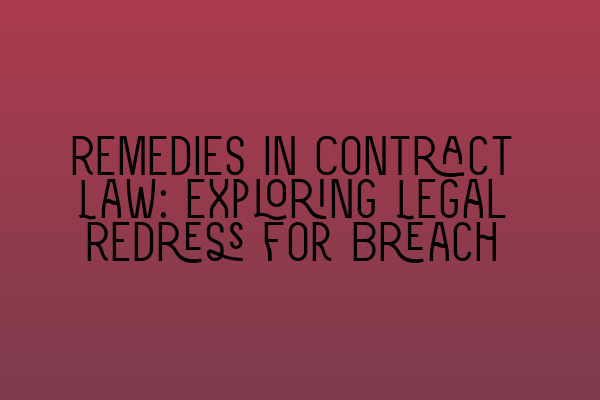Remedies in Contract Law: Exploring Legal Redress for Breach
Introduction
Contracts form the foundation of countless legal relationships in both personal and business contexts. When parties enter into a contract, they expect that the agreed-upon terms will be fulfilled. Unfortunately, breaches of contract do occur, and in such situations, it becomes crucial to understand the available legal remedies. In this blog post, we will delve into the various remedies in contract law and explore the avenues for seeking legal redress in the event of a breach.
1. Types of Remedies
1.1 Damages
Damages are the most common remedy sought for breaches of contract. They aim to compensate the injured party for any financial loss suffered due to the breach. There are two types of damages available:
1.1.1 Compensatory Damages
Compensatory damages aim to put the aggrieved party in the same financial position they would have been in had the breach not occurred. The damages awarded are based on the actual losses incurred as a direct result of the breach.
1.1.2 Consequential Damages
Consequential damages, also known as special damages, go beyond the direct losses and encompass any foreseeable indirect losses caused by the breach. These damages may include lost profits or other economic losses that are not immediately apparent.
To understand these concepts further, you can refer to our article on SQE 1 Practice Exam Questions.
1.2 Specific Performance
In certain situations, a monetary award may not adequately remedy the harm caused by a breach. In such cases, the non-breaching party may seek specific performance. This remedy involves the court ordering the breaching party to fulfill their obligations as specified in the contract. Specific performance is generally granted when the subject matter of the contract is unique or when monetary damages are insufficient.
To learn more about specific performance and other remedies in contract law, you can explore our SQE 1 Practice Mocks FLK1 FLK2 resources.
1.3 Rescission and Restitution
Rescission and restitution provide another avenue for seeking legal redress in the event of a breach. Rescission involves canceling the contract, treating it as if it never existed. Restitution, on the other hand, aims to restore the parties to their pre-contractual positions by returning any benefits received under the contract.
To gain a comprehensive understanding of these remedies, we recommend exploring our SQE 2 Preparation Courses.
2. Factors Influencing Remedies
Various factors can influence the type of remedy available to an aggrieved party. These factors include:
2.1 Nature of the Breach
The nature and extent of the breach play a vital role in determining the appropriate remedy. Courts often consider the severity of the breach and whether it was a minor or material breach of contract.
2.2 Availability of Specific Performance
As mentioned earlier, specific performance is a unique remedy granted in specific circumstances. It is contingent upon the subject matter of the contract and the feasibility of enforcing the specific performance.
2.3 Mitigation of Damages
The injured party has a duty to mitigate their damages by taking reasonable steps to minimize their losses. Failure to mitigate can affect the damages awarded or the availability of other remedies.
To gain a deeper understanding of these factors and how they influence the choice of remedy, you may find it helpful to explore our SQE 1 Preparation Courses.
Conclusion
In contract law, breaches can lead to significant financial and commercial consequences. Understanding the available legal remedies is crucial for safeguarding the rights of the aggrieved party and ensuring fair compensation. By exploring remedies such as damages, specific performance, rescission, and restitution, individuals and businesses can navigate the complexities of contract law more effectively.
If you’re interested in learning more about contract law or want to stay updated on the latest SRA SQE exam dates, we invite you to visit our page on SRA SQE Exam Dates. Our team of experts is here to assist you in your legal journey.
